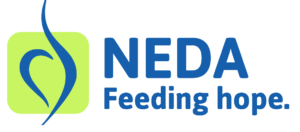- Calls to this hotline are currently being directed to Within Health, Fay or Eating Disorder Solutions
- Representatives are standing by 24/7 to help answer your questions
- All calls are confidential and HIPAA compliant
- There is no obligation or cost to call
- Eating Disorder Hope does not receive any commissions or fees dependent upon which provider you select
- Additional treatment providers are located on our directory or samhsa.gov
What is National Eating Disorders Awareness Week?

NEDA Week is upon us, which likely has many of you saying – what is NEDA Week?
For those in the eating disorder and Health At Every Size community, NEDA Week is a yearly staple. However, those new to the community may be in the dark as to what this week is for and why it matters.
NEDA
NEDA is the National Eating Disorders Association, the largest non-profit organization dedicated to supporting individuals and loved ones impacted by eating disorders [1]. Founded in 2001, NEDA strives to provide information and support for the 20 million women and 10 million men who will suffer from an eating disorder at some point in their lifetime [1].
Not only that, NEDA recognized the need for an organization that supported those individuals and their loved ones in understanding these harrowing disorders. NEDA is a huge advocate in many areas important to combat eating disorders, for example, campaigning for prevention, improved access to treatment, and increased research funding.
The Week
Often referred to as NEDAwareness Week, the tradition of focusing on eating disorder advocacy and support in the last week of February/first week of March has been observed for over 30 years [2].

Hosted by NEDA, this week has often involved numerous supportive, inspiring, and informative opportunities in communities around the United States and the world.
Many of these include talks, resource fairs, social media messaging and engagements, and community walks focused on raising awareness and money to finance treatment and research of eating disorders.
In 2018, this week took on an even bigger life when the United States Senate passed Resolution 419, officially declaring February 26 – March 4th as National Eating Disorders Awareness Week in the US [2]. Each NEDAwareness Week often has a theme with topics such as “Time to Talk About it,” “I Had No Idea,” “Everybody Knows Somebody,” and, in 2018, “Let’s Get Real.”
For 2019, the theme, Come As You Are, “highlights NEDA’s movement towards inclusivity in the greater eating disorder community and our goal of unifying the field of eating disorders [3].” As their website boldly states, “’Come as You Are’ sends a message to individuals at all stages of body acceptance and eating disorders recovery that their stories are valid [3].”
 Eating Disorder Hope is proudly collaborating with NEDA once again to promote this theme by “featuring relevant articles, videos and special social media events throughout the month to bring greater awareness and support the message [4].”
Eating Disorder Hope is proudly collaborating with NEDA once again to promote this theme by “featuring relevant articles, videos and special social media events throughout the month to bring greater awareness and support the message [4].”
If you’re feeling moved by this important message and cause and want to be a part of this year’s NEDAwareness Week, there is no shortage of ways to get involved, from engaging in social media, sharing your story, or joining in on a walk in your community.
To learn how you can get involved in a way that is meaningful for you, visit https://www.nationaleatingdisorders.org/get-involved/nedawareness.
Resources:
[1] Unknown (2018). Our Work. National Eating Disorders Association. Retrieved on February 24, 2019, from https://www.nationaleatingdisorders.org/about-us/our-work. [2] Unknown (2018). Eating disorders activists receive trailblazing congressional support. National Eating Disorders Association. Retrieved on February 24, 2019, from https://www.nationaleatingdisorders.org/united-states-senate-officially-declares-feb-26-%E2%80%93-mar-4-national-eating-disorders-awareness-week-us. [3] Unknown (2018). National eating disorders awareness week. National Eating Disorders Association. Retrieved on February 24, 2019, from https://www.nationaleatingdisorders.org/get-involved/nedawareness. [4] Unknown (2018). Eating disorder hope. Retrieved on February 24, 2019, from https://www.eatingdisorderhope.com/. About the Author:
About the Author:
Margot Rittenhouse, MS, PLPC, NCC is a therapist who is passionate about providing mental health support to all in need and has worked with clients with substance abuse issues, eating disorders, domestic violence victims, and offenders, and severely mentally ill youth.
As a freelance writer for Eating Disorder Hope and Addiction Hope and a mentor with MentorConnect, Margot is a passionate eating disorder advocate, committed to de-stigmatizing these illnesses while showing support for those struggling through mentoring, writing, and volunteering. Margot has a Master’s of Science in Clinical Mental Health Counseling from Johns Hopkins University.
The opinions and views of our guest contributors are shared to provide a broad perspective on eating disorders. These are not necessarily the views of Eating Disorder Hope, but an effort to offer a discussion of various issues by different concerned individuals.
We at Eating Disorder Hope understand that eating disorders result from a combination of environmental and genetic factors. If you or a loved one are suffering from an eating disorder, please know that there is hope for you, and seek immediate professional help.
Published on February 26, 2019.
Reviewed & Approved on February 26, 2019, by Jacquelyn Ekern MS, LPC
Published on EatingDisorderHope.com

The EatingDisorderHope.com editorial team comprises experienced writers, editors, and medical reviewers specializing in eating disorders, treatment, and mental and behavioral health.

